Trading Day: ASX recoups 2020 losses after Dow makes history
Stocks rally to new nine-month highs erasing 2020’s losses caused by the COVID crisis.
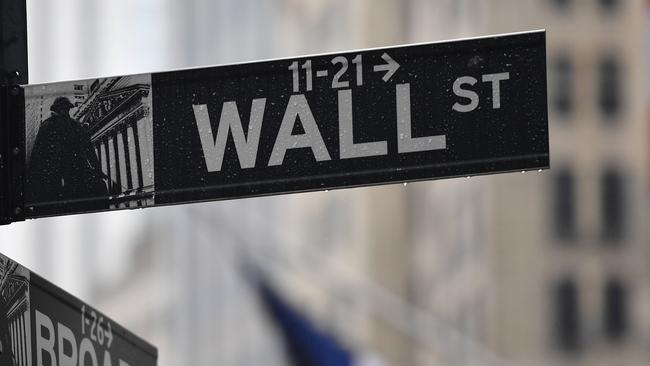
- Packer-backed Ellerston buys into Maggie Beer
- The Dow’s remarkable rally
- Copper prices tipped to surge
- Musk becomes 2nd wealthiest person
That’s all from the Trading Day blog for Wednesday, November 25. Australia’s S&P/ASX 200 share index finished up 39 points or 0.6pc at 6683.3 - its best daily close since February - after hitting a 9-month high of 6713.3 intraday after gains on Wall Street, where the Dow topped 30,000 for the first time. The Dow closed up 1.5 per cent at 30,045 points, the S&P 500 jumped 1.6 per cent and the Nasdaq added 1.3 per cent. Harvey Norman was among companies holding AGMs today.
James Kirby 6.51pm: Don’t pop the champagne yet investors
Ring the bells if you must, but the message from the almost there rally on the ASX is not entirely convincing.
In the overall scheme of things, it is a late attempt to get back to where we left off at the start of the year.
No doubt the prospect of having lost nothing over the year is a great relief to many sharemarket investors.
But let’s get serious, despite powerful tailwinds from Wall Street and an enormous government stimulus, our market has yet to start making money on a net basis for most investors.
Pretty soon, we’ll get to celebrate crossing the point we had reached at the start of the year - 6684 - before Covid-19 struck. Only then will we get to see the true colours of this recovery rally.
Unless investors have stuck bravely with a smart stock selection all year - this has been a tough ride.
Elise Shaw 6.04pm: ARA concern over cost rise of junior employment
The Australian Retailers Association (ARA) has today expressed its concern at the Fair Work Commission’s (FWC) decision that will raise the cost of junior employment at a time that many retailers are fighting for survival.
ARA CEO Paul Zahra said: “We are in the first recession for almost three decades and it’s disappointing to see the Fair Work Commission continue to elevate the costs of employing staff. This unfortunately demonstrates the FWC are out of touch with the prevailing economic conditions facing retailers,” Mr Zahra said.
“We are also concerned that the main effect of the decision will be to reduce the opportunities available for young Australians to find secure work, and make it more prohibitive for retailers to train young staff,” he said.
“The ARA acknowledges that the larger cohort of level 2 and 3 employees will not be affected, which aligns with our position on the issue.”
Mr Zahra said that the appearance of fairness veiled the reality that junior applicants would be left to fight for the same positions as more experienced, adult employees, without the industry benefit of junior rates.
“Junior rates provide a proven benefit for young Australians seeking employment early in their lives, providing an incentive for retailers looking to give opportunities to applicants which lack the training and experience of their established peers,” he said.
“We hope that the Commission will in future provide more careful consideration to the economic conditions and the unintended consequences of its decisions on retailers and the long-term prospects of their employees,” Mr Zahra concluded.
Elise Shaw 5.08pm: $A pares gains despite weak USD
Commonwealth Bank Global Markets Research team notes AUD/USD pared earlier gains and is trading near US73.50c despite the weak USD and strong commodity prices.
“Australian Q3 20 construction work done fell by more than expected at ‑2.6%/qtr. Building work done fell by 2.0%/qtr while engineering work fell by 3.3%/qtr. Housing renovations (alterations and additions) was the strongest element, rising 5.1%/qtr and suggests a small lift in the dwelling investment component of Q3 20 GDP (due 2 December),” the team said.
“USD remained heavy in the Asia session. The increased chance of a smooth transition of power in the US is weighing on the USD. President‑elect Biden has been granted funding to start the transition process. President‑elect Biden’s nomination of former FOMC chair Janet Yellen is also a weight on the USD.
“As FOMC chair, Dr Yellen was considered dovish. If confirmed by the Senate, Dr Yellen is likely to seek a larger role for government to speed up the economic recovery. We identified the pre‑set fiscal contraction as a significant downside risk to the US economic recovery.
“A strong US economic recovery is often associated with a strong world economic recovery and a weaker USD.
Nevertheless, USD can be supported if jobless claims lift. Higher jobless claims are consistent with a slowdown in the US economy and raises the risk financial markets price in a global double‑dip recession. October US trade balance, durable goods orders and the PCE deflator are also released.
“The FOMC’s November meeting minutes can also drive USD direction today. If the minutes suggest the FOMC will change (increase) its asset purchase program in December, USD can lift.”
4.45pm: ASX ends +0.6pc in value rally
Australia’s S&P/ASX 200 share index finished up 39 points or 0.6pc at 6683.3 - its best daily close since February - after hitting a 9-month high of 6713.3 intraday.
While underpinned by a further rise in US index futures and crude oil prices in APAC trading, the index closed on the day’s low. Still the US market normally rises in Thanksgiving week.
After bouncing 52pc from a 7.5 year low of 4402.5 in March on unprecedented fiscal and monetary policy stimulus and, more recently, COVID vaccine and US election euphoria, the index was less than a point away from recording a year to date gain.
While it faces some risk of rebalancing by balanced funds before month end, the index is on track for a month-to-date gain of 12.7pc, its best since inception in 2000. The longstanding, All Ordinaries index is having its best month since 1988.
Wednesday’s rise was driven by a further rush to value stocks in the Energy, Financials, Materials and Real Estate sectors, aided by rising industrial commodity prices and bond yields, as investors anticipated stronger economic growth.
Among standouts in those sectors, Origin rose 4pc, NAB rose 3.1pc, BHP rose 3pc and Scentre gained 3.5pc.
Growth and quality stocks in the Tech, Health Care, Communications, Industrials and Staples sectors were used to fund the switch to value.
Afterpay dived almost 6 per cent, Xero lost 4.4pc and CSL dived 2.5pc.
Patrick Commins 3.52pm: No permanent damage from Covid: Moody’s
Global ratings agency Moody’s says Australia’s economy will not emerge from the COVID-19 crisis permanently weaker, paving the way for the country to remain one of the few AAA-rated nations in the world on the other side of the pandemic.
In a new report on Wednesday, the New York-based firm said despite the most severe contraction on record in the June quarter, Australia was “unlikely to face a lasting drop in potential growth or weakening in fiscal strength over the longer term”.
The welcome vote of confidence from one of the three major in international ratings agencies comes as the nation charts a surprisingly brisk path out of the COVID-19 recession, with Victoria’s success in suppressing the second wave of virus cases paving the way for the removal of internal borders as community transmission of the disease dwindles to zero.
Moody’s said the Morrison government’s “substantial policy response is helping viable companies to survive the related shock to demand and to avoid the destruction of productive capacity”.
“Stimulus in response to the coronavirus outbreak does not significantly threaten fiscal strength over the longer term,” the report read. “Rather, the package highlights Australia’s flexibility and capacity to use fiscal policy to support its credit profile in a difficult global economic environment.”
But Moody’s warned that “a major driver of Australia’s potential growth rate will be the extent to which productivity growth picks up from the relatively weak levels experienced before the pandemic” - underlining the need for further policy reform as the economy transitions off emergency income support.
3.48pm: Bank balances booming: CBA
Household income growth has not slowed since the government began reducing the JobKeeper and JobSeeker payments in September, with Commonwealth Bank data showing the average savings balance at the bank was up 15.3 per cent in October 2020 compared to October of the previous year.
Commonwealth Bank Global Markets and Economics Research says this has been driven by wage and salaries plus government payments growth of 10 per cent in the fourth quarter of the year, “still well above pre-COVID levels”, despite a reduction in government support.
In addition, the number of Commonwealth Bank customers receiving JobSeeker has been coming down since the end of October, with the proportion of customers still receiving the benefit highest in the ACT and SA.
CBA said this was a sign of the labour market steadily improving and the sharp increase of savings accrued will support household consumption in the year ahead, predicting a GDP decline of 3.3 per cent in 2020, growth of 4.2 per cent in 2021 and 3.8 per cent in 2020, when the unemployment rate will likely be 4.5 per cent.
Bridget Carter 3.30pm: Liberty Financial locks in support
The $1.8bn non-bank lender Liberty Financial has locked in enough support for its initial public offering as its book build is held on Wednesday.
Liberty has secured enough demand to raise at least $321m at $6 per share, equating to 11 times its net profit.
It will list on December 17.
The company was earlier expected to achieve enough demand to cement its float plans, as tipped by DataRoom earlier in the week.
Working on the listing is Credit Suisse, along with retail brokers Evans and Partners and Shaw and Partners.
Market analysts expected much of the stock to be taken up by retail investors, although it is thought that a handful of institutional investors agreed to take small cornerstone stakes in the company, with a 20 per cent interest in the business on offer.
The founder group, excluding Sherman Ma, will sell a 17.6 per cent to 20 per cent interest in their holdings, as Liberty prepares to lodge its prospectus on November 26 with the company to list on December 17.
3.00pm: Rio Tinto faces further Mongolian scrutiny
Rio Tinto is reportedly coming under pressure over its Oyu Tolgoi copper mine in Mongolia, with Mongolian government - who have a 37 per cent stake in the venture - seeking an independent review into project delays and cost blowouts to a project expansion.
A report in the Financial Times states a review into the expansion is set to be proposed at a board meeting of Oyu Tolgoi LLC, the controlling entity, with the government focusing in on project management and mine design.
The government reportedly wants the review to be carried out by an external company selected by a special committee of board directors.
Rio subsidiary Turquoise Hill Resources has already commissioned a report into the delays and budget blowouts, and is currently reviewing its findings while in arbitration against Rio to clarify the financing of a $US3bn funding gap at Oyu Tolgoi.
The mine is of high importance to the Mongolian government as it provides thousands of jobs and is the biggest source of foreign direct investment.
But a promised first sustainable production target of the first quarter of 2021 has been moved to October 2022 while costs have increased from $US5.3bn to $US6.6bn-7.1bn.
The project has attracted scrutiny from US and UK regulators after former employee Richard Bowley claimed Rio was aware of problems with the project months before investors were informed.
2.20pm: Fitch puts Crown on negative watch
Fitch Ratings has placed Crown’s BBB long-term issuer default rating and senior unsecured rating on negative watch following last week’s announcement that the NSW gambling regulator has delayed the opening of the Barangaroo Crown Sydney casino.
The opening of the casino, originally due in December, has been delayed due to concerns over money laundering and corporate governance unearthed during an inquiry into its casino licence.
Fitch said these actions had highlighted an increased the risk of “severe” action by the NSW regulator, including the potential loss of the Barangaroo licence, as well as the potential for regulatory action in Victoria or Western Australia, where Crown also has casinos.
If severe regulatory action eventuated, Fitch said it would downgrade Crown’s ratings. However it said its analysts estimated Crown could absorb up to $800m in fines and penalties before its rating was impacted, due to its $240m available cash balance and $400m of undrawn facilities.
Last week Moody’s downgraded Crown to Baa3 from Baa2 - one level above junk - following the decision to delay Barangaroo’s opening.
Ben Wilmot 2.04pm: Hemmes snaps up another Sydney pub
Billionaire Justin Hemmes has extended his Merivale pub empire, buying the Duke of Gloucester Hotel in Sydney’s Randwick from prominent hospitality operator Good Beer Co for $32m.
The purchase of the pub, affectionately known by locals as The DOG, builds Merivale’s holdings in Sydney’s eastern suburbs, which already include the Royal Hotel Bondi, the Coogee Pavilion and the Centennial Hotel, Woollahra.
The deal was negotiated by JLL’s John Musca and Ben McDonald, and attracted significant interest from rival hoteliers, unlisted investment funds, family offices and wealthy individuals.
Good Beer Company’s John Azar said The DOG had been a “fantastic” hotel to own, and was being passed to well-respected operators.
Merivale said its purchase was a “strong vote of confidence in the future of the pub industry after a devastating year and an optimistic step forward in hospitality’s road to recovery”.
Merivale will receive the keys to The Duke of Gloucester in January, when it will unveil its plans for the venue.
The pub generates about $180,000 in weekly revenues and has 19 pokies.
It comes after ASX-listed Redcape’s announcement last week of the acquisition of the Gladstone Hotel in Dulwich Hill, in a transaction worth $38m.
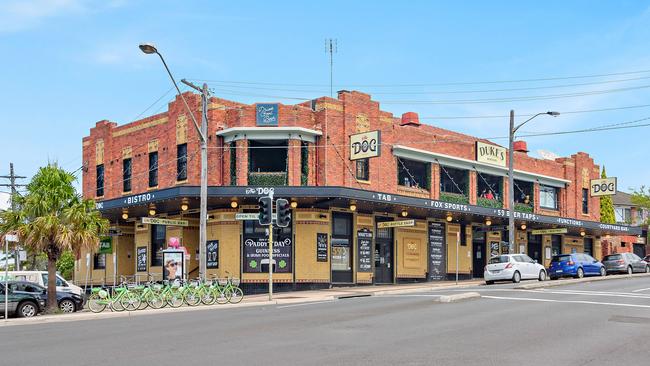
1.20pm: Northern Star lauds Saracen deal
Executive chair of Northern Star Resources Bill Beament says a pending merger with fellow gold miner Saracen Mineral Holdings will position the new company for “outperformance.”
“This merger, which is subject to the approval of Saracen shareholders, will see your company become the second biggest gold producer on the ASX,” Mr Beament told shareholders at the AGM.
“Along the way, the deal is expected to generate synergies of up to $2 billion.
“Production of the combined group is forecast to grow by 30 per cent over the next three years with a clear trajectory towards two million ounces a year by FY27.
“This combination of vast synergies, substantial production increases, long mine lives underpinned by 19Moz of Reserves and 49Moz of Resources and capital-light growth makes this a truly unique transaction.”
Bridget Carter 1.16pm: Barrenjoey lures Stanton from JPMorgan
Real estate investment banker Rob Stanton is leaving JPMorgan to join Barrenjoey Capital, which has been on a hiring spree ahead of its launch next year.
Mr Stanton started at JPMorgan in 2007 as a real estate investment trust analyst before becoming head of Australian equities in 2011 and managing director of real estate banking in 2014.
Before that he worked as an analyst at Macquarie Group from 2001 and a development manager at Lendlease between 1994 and 2000.
His recent clients have included Charter Hall, Blackstone and National Storage REIT.
The appointment of Mr Stanton comes amid a major reshuffle of investment bankers in Australia following the launch of new firms in the market.
The newly-formed Barrenjoey Capital is headed by former top UBS Australia investment banking operatives, including Guy Fowler, and it’s been busy recruiting high-profile figures from rival firms.
Last month, it poached Australia’s most dominant block trader, George Kanaan, from UBS, along with its Australian head of infrastructure banking Jarrod Key and his team members.
Other real estate team members have shifted roles.
Meanwhile one of the country’s top real estate investment banking operatives, Tim Church, recently left UBS as head of real estate in Australia to take on the role of Australian chairman at Morgan Stanley, luring at least one team member into the American firm.
Former UBS property banker Mitchell Schauer will head up real estate investment banking for Jarden Australia, which has also poached former UBS Australia investment banking head Aidan Allen, along with senior capital markets specialist Robbie Vanderzeil and Goldman Sachs Australia head of equities Sarah Rennie, who also previously worked at UBS.
In the past year, JPMorgan hired former Credit Suisse banker Duncan Mann to head up its private equity and industrial company coverage.
12.55pm: Rotation to banks continues: traders
Coronavirus vaccines and improving prospects for US fiscal stimulus are causing a massive rotation to value stocks in Australia as well as globally.
Australia’s extremely low rates of COVID and easing restrictions should arguably see a faster economic rebound here than the US and Europe, where Thanksgiving and Christmas loom as major COVID-spreading events.
With improving economic growth prospects, Australian 10-year bond yield has risen to 0.95pc versus a SIX-month average of 0.86pc. And the yield curve has steepened with the 3-10 year bond yield spread now at 83 basis points, close to its highest point since March.
With crude oil leading a surge in industrial commodity prices, the S&P/ASX 200 Energy sector is strongest by far, with a month-to-date rise of 35 per cent versus 13 per cent for the S&P/ASX 200 index.
But while the S&P/ASX 200 Financials sector is a distant second, with a month-to-date rise of 19.4pc, there’s a deluge of institutional money flowing into the sector, according to traders.
An institutional rotation into Australian banks has continued on large volume in the past two weeks and this week in particular, they say.
Bridget Carter 12.46pm: East to chair soon-to-list Cettire
Tourism Australia chairman Bob East has been tapped to take the top boardroom position at online luxury fashion emporium Cettire, which is about to list on the Australian Securities Exchange as a $190m company.
Cettire, to be chaired by Mr East, has locked in a share price for its initial public offering this year at 50c each, which equates to 2.2 times its net revenue.
Mr East previously ran the Australian hotel chain Mantra and as well as the Tourism Australia role, he is also chairman of the Australian Venue Company, Experience Co and deputy chairman of the Gold Coast Suns Football Club.
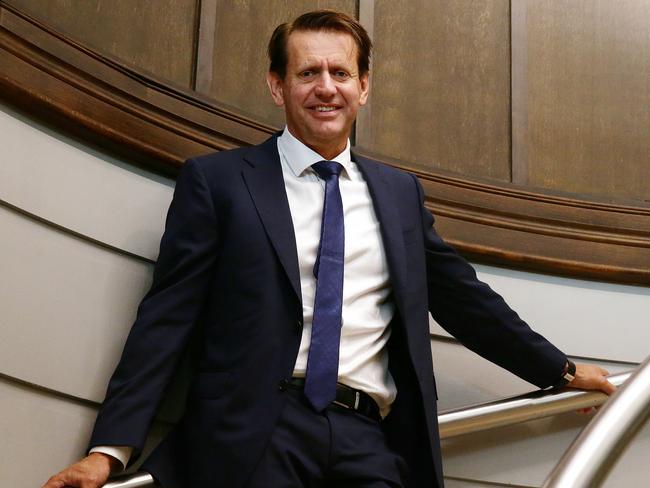
Working on the float of Cettire has been Highbury Partnership and Bell Potter, with the company raising $65m on Tuesday through a book build that was oversubscribed after two hours.
Cettire is similar to Net-a-Porter, selling high end luxury goods and designer clothing, with 60 per cent of its sales generated in the United States, 30 per cent in Europe and 6 per cent in Australia.
The business is founded and owned by Melbourne-based Dean Mintz.
Cettire has been compared to online retailer Farfetch, which trades at 8 times its revenue and is worth $15bn.
12.07pm: ASX posts fresh nine-month high
Australia’s share market may extend its intraday gain, as US futures have risen further after strong gains on Wall Street following good news on coronavirus vaccines and US politics this week.
The S&P/ASX 200 was up 0.8pc at 6695.8 at midday after rising as much as 1pc to a fresh nine-month high of 6713.3 after the S&P 500 rose a bigger than expected 1.3pc overnight.
The index will have recouped all of its year-to-date fall on the COVID crisis if it ends the day above 6684.
S&P 500 futures futures have risen 0.5pc in APAC trading, underpinning the Australian market.
Value stocks in the Energy, Financials, Real Estate, Utilities, Materials and Consumer Discretionary sectors are outperforming.
Among standouts in those sectors, Origin is up 4.6pc, NAB is up 2.3pc, Scentre is up 3.2pc, AGL is up 3.2pc, BHP is up 1.7pc, and Webjet is up 6.2pc.
Energy stocks remain underpinned by stronger crude oil prices, with WTI futures holding most of a 4.1pc overnight gain, while Australia’s 10-year bond yield rose 5bps to 0.94pc, boosting Financials and REITS.
Growth stocks in the Tech, Health Care and Communications sectors are taking a breather, with Xero down 3.8pc, Afterpay down 2.5pc, Nextdc down 4.8pc, CSL down 1pc and Resmed down 2.5pc.
Gold miners remain under pressure along with the spot price, with Evolution down 2pc.
Perry Williams 12.01pm: Liveris gas price target a fantasy: Beach
The Kerry Stokes-backed Beach Energy says a $4 a gigajoule target for contracted gas on the east coast is “fantasy” with no supplies able to be produced at that price level.
Former Dow boss Andrew Liveris - who advised the government‘s National Covid Coordination Commission on how manufacturing could help boost the economy out of the pandemic - initially set a $4GJ target earlier this year, though more recently suggested a $4-6 goal may be more realistic.
However, Beach said producers could not meet that target.
“It needs to be cautioned that talk of $4 gas for term contracts is a fantasy because, to put it simply, this gas doesn’t exist,” Beach chief executive Matt Kay told the company’s annual general meeting on Wednesday.
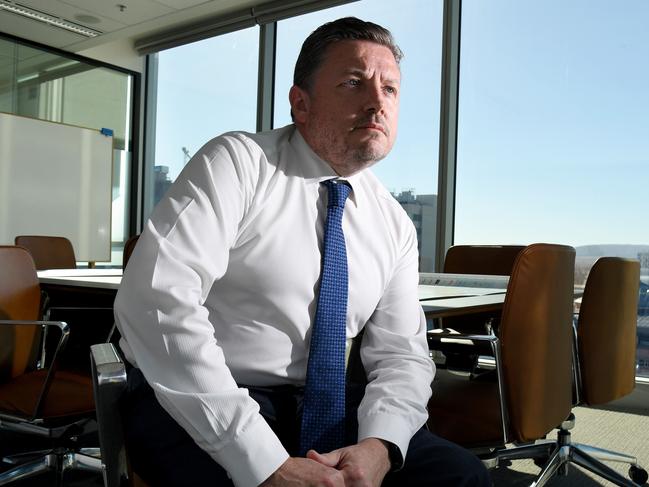
“The most recent ACCC gas report states that contracted prices for 2021 delivery are in the $8-11 per gigajoule range. This is the reality of where we are at because these are the prices necessary to facilitate the long-term investment required to develop gas for customers.”
Beach also confirmed a final investment decision is due to be made in December for its Waitsia Stage 2 project in Western Australia.
Gas from the onshore Waitsia field - owned by Beach Energy and Mitsui - will be processed at the North West Shelf LNG plant for the first time from 2023 as the Woodside Petroleum-operated facility moves to become a tolling facility due to dwindling existing supplies. About 1.5 million tonnes of LNG a year will be supplied to the plant from Waitsia, equivalent to nearly 10 per cent of the plant’s 16.9 million tonne annual capacity.
11.44am: Construction down 2.6pc in quarter
Construction work done for the September quarter dived 2.6pc versus a 2pc fall expected by economists.
The weakest quarter for construction since the December quarter of 2019 came amid Victorian lockdowns which have since been substantially lifted.
Ben Wilmot 11.40am: Charter Hall raises $2.6bn in industrial fund play
The industrial property boom is taking on a life of its own in the wake of the coronavirus crisis, with Charter Hall’s main fund in the area just closing its latest raising to take its tally to $2.6bn since April.
The move comes in the wake of Goodman Group’s main local fund raising $1bn and selling $450m worth of assets to give it the firepower to expand, and Hong Kong-based ESR also raising heavily for its funds.
The moves come as retail property funds, which own shopping centres, suffer heavy outflows or are seeking to reposition their assets as mixed use plays with commercial and residential elements.
Charter Hall said its flagship $5.8bn Charter Hall Prime Industrial Fund had closed the capital raising “significantly oversubscribed”, indicating there is still more demand for industrial property.
In a sign of the depth in once-staid sector, the raising was supported by both Charter Hall’s existing backers and it managed to introduce 29 new investors, made up of a mix of Australian and offshore investors including super funds, pension plans, sovereign wealth funds and insurers across Asia, the Middle East, Europe and North America.
Charter Hall CEO David Harrison said the company had a strong level of support for the fund despite the economic uncertainty caused by COVID-19.
Charter Hall is now jostling with Goodman for top ranking locally and its industrial and logistics platform tops $11.5bn, holding significant growth prospects.
11.34am: Ellerston buys into Maggie Beer
The James Packer-backed Ellerston Capital has picked up a seven per cent stake in premium food business Maggie Beer Holdings worth about $5.83m.
Documents released to the market show Ellerston Capital picked up 14,952,927 shares in the company, becoming a substantial shareholder with a voting power of 7.20 per cent.
Maggie Beer Holdings was trading at $0.39 cents a share on Wednesday morning, down 1.27 per cent.
James Packer stepped down from the Ellerston board in 2011 but retains a small stake in the company.
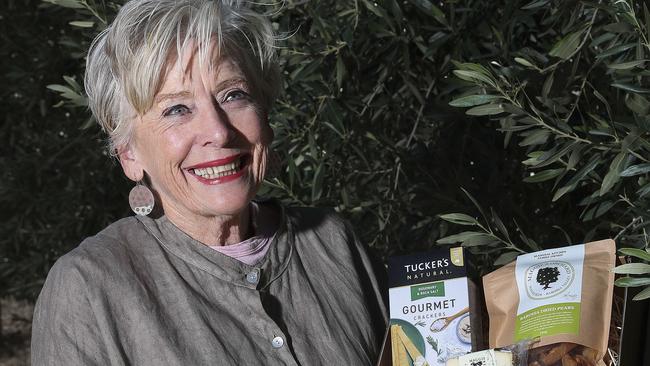
Eli Greenblat 11.30am: Harvey Norman avoids pay ‘first strike’
Harvey Norman has escaped a “first strike’ against its remuneration report at the annual general meeting on Wednesday.
Proxy votes lodged before the meeting showed 41.69 million shares voted against the remuneration report, or 11.4 per cent, with 82.7 per cent supporting the remuneration report. An against vote exceeding 25 per cent is needed to trigger a strike against the adoption of the remuneration report.
Last year Harvey Norman attracted a second strike against its remuneration report, but a later vote at that meeting on holding a meeting to spill the board failed.
At the AGM on Wednesday Chris Mentis attracted a 29.44 per cent vote against his re-election and a 68.49 per cent vote in favour. The election of Luisa Catanzaro attracted proxy votes in favour of 97.89 per cent.
11.23am: Tokyo stocks open higher
Tokyo stocks opened higher as investors took heart from rallies on Wall Street thanks to receding US political uncertainty.
The benchmark Nikkei 225 index was up 1.22 per cent or 319.71 points at 26,485.30 in early trade, while the broader Topix index advanced 1.08 per cent or 18.95 points to 1,781.35.
AFP
10.56am: Xero announces notes issue
Xero has announced it has priced zero coupon $US700m senior unsecured convertible notes.
The notes will mature on December 2 2025 and will have an initial conversion price of $US134.7246 per ordinary share, a conversion premium of 35 per cent over the reference share price.
The company expects net proceeds of $US685.3m to be used to fund the costs of call option transactions, to repurchase existing notes, for corporate purposes and to fund potential acquisitions and strategic investments.
A total of $US294.031m of the existing convertible notes due in 2023 will be subject to a buyback, while the existing call spread arrangement will be wound down in favour of a new call spread arrangement netting $US19.6m.
Goldman Sachs International and Morgan Stanley & Co International will act as joint lead managers on the offering.
10.50am: Analysts’ doubts over Unibail
Ord Minnett has moved shopping centre landlord Unibail-Rodamco-Westfield to hold, with analysts expecting the company’s loan-to-value ratio to come under pressure from falling values, and believing the European retail market will take time to improve.
ASX traded shares in the company have rallied more than 12 per cent to $5.10 this week. Ord Minnett analysts say this is approaching “fair value” but see little reason for the rally to continue given continual COVID-19 case growth in Europe and a structural shift to online shopping.
10.25am: ASX recoups 2020 losses
Australia’s share market has turned up for the year, after rising one per cent to a nine-month high of 6713 following strong gains on Wall Street, where the Dow topped 30,000 for the first time.
If it ends above 6684 the index will close in positive territory on a year-to-date basis for the first time since February 26.
The index fell as much as 39pc early this year from a record high of 7197.2 to a 7.5-year low of 4402.5 on the COVID crisis and has since rebounded by 52 per cent.
Value stocks in the Energy, Utilities, Financials, Consumer Discretionary and Materials sectors are outperforming.
Among standouts in those sectors, Origin is up 5.4pc, AGL is up 2.6pc, CBA is up 2pc, Webjet is up 9pc and and BHP is up 2.1pc.
Lisa Allen 10.09am: Arnaout’s Iris in $180m hotels deal
Sydney publican Sam Arnaout of Iris Capital has snared the biggest hotel deal of the year paying around $180m for 17 hotels including Melbourne’s Ibis Hotel and Apartments.
It is understood that Elanor Investors also attempted to acquire the portfolio, which has been on the market for several years.
The vendor is Accor Invest and it is understood Blackstone also looked at the portfolio, which last year was going to be picked up by the failed investor Michael Gu for an aggressive $220m.
JLL Hotels Craig Collins and Peter Harper negotiated the deal.
10.00am: Xero in trading pause
Accounting software company Xero Limited has paused trading “pending a further announcement”.
The company closed on Tuesday at $135.86 a share
9.56am: Galaxy to raise $161m for Argentina project
Lithium miner Galaxy Resources has announced a fully underwritten $161m raising to finance stage one of its Sal de Vida lithium brine project in Argentina, in a one for 14 pro-rata offer.
The miner says the funding will put it in a position to continue with the Sal de Vida capital program “in advance of scheduled first production in late 2022.”
The new shares will be issued at $1.70, a 15 per cent discount on the last close of $2 and a 8.1 per cent discount to the 10-day volume-weighted average price.
“As a result of the offer, Galaxy’s balance sheet will be further strengthened with pro-forma cash and financial assets to increase from $US102 million as at November 1, 2020, to $US219 million (before Offer costs),” the company said.
The offer will also fund pre-development activities at the James Bay lithium project in Canada.
Meanwhle, it looks like some investors got “lucky” selling Galaxy shares yesterday before the capital raise today. Galaxy shares fell 3.9pc from a 22-month intraday high of $2.28 to close at $2.00 despite the renewed positive backdrop for lithium stocks following Joe Biden’s win.
9.45am: ASX tipped for new 9-month highs
Australia’s share market is set for a fresh nine-month high after Wall Street rose more than expected.
Overnight futures relative to fair value suggest the S&P/ASX 200 will open up 0.6pc at 6684 - highest since February 27.
That follows a 1.6pc rise in the S&P 500 to 3004.6 points - a fresh all-time high on a daily closing basis.
While the growth-rich Nasdaq is yet to break its August peak as investors switch to value, the S&P 500 looks capable of a “melt-up” to 4000 on a purely technical basis.
Month-end rebalancing by balanced funds is a risk and Thanksgiving and Christmas loom as a COVID spreading events in the Northern Hemisphere.
But coronavirus vaccines and Joe Biden’s US election win have boosted confidence in global economic recovery.
Historically, the S&P 500 has risen 84pc and the Nasdaq has risen 92pc of the time from Tuesday’s close through Friday of Thanksgiving week so traders won’t want to buck the rise this week.
Australia’s S&P/ASX 200 also faces a big month-end rebalance after an amazing 12.1pc month-to-date rise.
But that could easily be eclipsed by the scramble for exposure to expected global economic recovery.
On the charts, the S&P/ASX 200 now has potentially strong support at 6500 and no clear resistance until 6900.
Energy, Financials and Materials should be the standouts today as was the case on Wall Street.
WTI crude rose 4.1pc, while copper rose 1.6pc, Nickel gained 1.9pc and spot iron ore rose 1.5pc.
Gold miners will drag again after the spot price fell another 1.7pc to $US1807.6 an ounce.
9.42am: Iron ore miners rated ‘outperform’
Analysts at Macquarie are maintaining an outperform recommendation on Australia’s listed iron ore miners as the global price progresses towards a six-year high of $US130 a tonne and Chinese steel margins remain high, positively impacting demand.
Fortescue Metals group is the analysts’ preferred large cap miner due to its stronger exposure to iron ore and strong shipments track record this year. But the analysts remain positive on Rio Tinto and BHP, with Mineral Resources the preferred mid-cap pick due to its plan to grow its iron ore business over three to five years.
Cliona O’Dowd 9.34am: IOOF assures investors on MLC deal
Wealth manager IOOF has sought to reassure shareholders on the benefits of its $1.44bn deal to acquire MLC, with chief executive Renato Mota saying a bigger and better IOOF will be at the forefront of industry transformation.
Addressing shareholders at the annual general meeting on Wednesday, Mr Mota said he recognised the impact on existing shareholders of funding the acquisition.
“It’s only through extensive diligence, negotiation and by leveraging prior experience that one can assess the merits of these transformational opportunities on balance,” Mr Mota said.
“IOOF has a strong track record in relation to integration of businesses. The acquisition of MLC will deliver significant future benefits for all of our stakeholders, including our shareholders.
“We expect to deliver in excess of 20 per cent earnings per share accretion in future years, underpinned by $150m per annum of targeted pre-tax synergies by the third full year of ownership.”
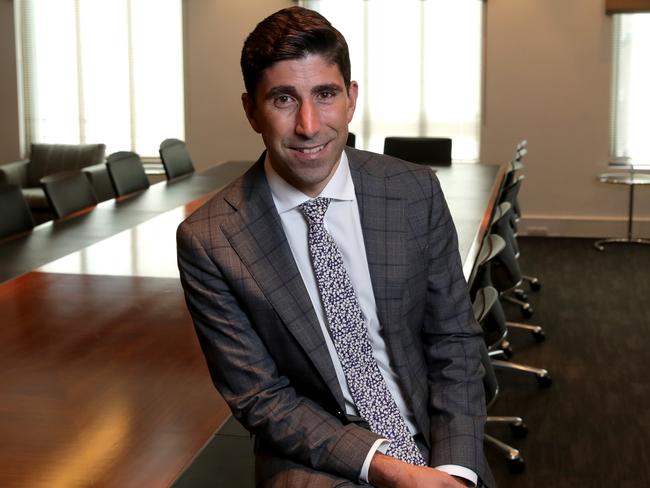
IOOF in August announced it had agreed to buy NAB’s wealth arm, MLC, as it sets its sights on becoming the nation’s largest financial advice business.
The deal is subject to approval by the ACCC and the banking regulator and has been criticised by some shareholders who say IOOF overpaid for the business and questioned its ability to deliver on its predicted synergies.
Integration risks, the prospect of cost blowouts and adviser exits have all weighed on investor sentiment, with IOOF’s share price yet to recover from the more-than 20 per cent drop it took immediately after the acquisition was announced.
IOOF’s shares were trading at $4.26 before the deal was announced and closed Tuesday’s session at $3.71.
9.25am: Link still in takeover talks
Link Administration Holdings says it is still in talks with a Pacific Equity Partners, Carlyle Group and others over a $2.9 billion takeover offer for the company.
The consortium of suitors has gained access to a virtual dataroom and continues to gain access to Link Group’s executive leadership team for question and answer sessions.
The company also says it’s demerger of its 44.2 per cent interest in PEXA is continuing, with the expected timing for a potential Link Property listing “the first half of calendar 2021.”
9.22am: Harvey Norman pretax profit more than doubles
Harvey Norman Holdings said its pretax profit more than doubled between July 1 and October 31, despite the impact of lockdowns in key markets including Victoria and New Zealand’s Auckland region.
Harvey Norman said its unaudited pretax profit totalled $341.1 million in the first four months of the 2021 fiscal year, up from $131.2 million in the corresponding period a year ago.
Aggregated sales revenue rose by 28pc between July 1 and November 21, while comparable sales lifted by a similar amount over the same period.
Harvey Norman’s store footprint extends from New Zealand through Southeast Asia to Europe.
Dow Jones Newswires
9.20am: Energy stocks underpriced: Credit Suisse
Analysts at Credit Suisse believe Australian energy stocks like Origin, Beach Energy and Worley are underpriced, with the market not having factored in the likely return of oil prices to $US60 - $US65 a barrel or higher, depending on OPEC actions.
Able to benefit both from lower or higher economic growth, the analysts believe the “value factor” of these energy stocks give them a 20 to 50 per cent upside, despite the sector’s rally in recent days.
“We are transitioning from a world dominated by momentum and quality factors, to one where value and quality factors matter most,” the analysts said.
9.19am: Platinum Asset upgraded
Bell Potter’s Lafitani Sotiriou has upgraded Platinum Asset Management to Hold from Sell, while boosting his price target by 44pc to $3.60 to account for recent strong international market gains and better net inflows relative to expectations for the value-focussed global fund manager.
“Overall, we have material upgrades as Platinum remains highly sensitive to improving market conditions,” he says. “Particularly in an environment where value stocks are benefiting.”
PTM last at $3.53.
9.14am: Value rotation risk to Magellan: MS
The current rotation from growth to value stocks amid expectations of global economic recovery threatens to crimp the fund inflows and share price valuation multiples of growth-focussed Magellan Financial Group, according to Morgan Stanley’s Andrew Standnik.
“Magellan’s strategies have seen negative returns on the value rotation,” Mr Stadnik says.
“We think retail flows should remain resilient given Magellan’s strong brand and distribution, but we see redemption risks in institutional. We think these risks are not in the price with the stock on about 25 times price-to-earnings and reiterate our Underweight rating.”
9.05am: Woolies tops online shopping survey
Woolworths is the clear standout in a surge in online grocery shopping which is driving market share gains for the supermarkets giant, according to a proprietary survey of 1800 shoppers by Citi.
The survey shows a “clear path to 10 per cent penetration” of online grocery shopping, which is “likely faster than our expectations,” the broker says.
“COVID-19 accelerated the shift to online, with an incremental 21 per cent of shoppers entering the online channel through COVID-19, a material step up on the 11 per cent of shoppers in the channel pre-COVID 19, with Woolworths capitalising on the online customer acquisition opportunity,” says Citi’s Bryan Raymond.
“Our forecasts for double digit online penetration in FY24 earnings for Woolworths and FY25 earnings for Coles may prove conservative given low attrition rates.”
Woolies is “the online standout” as it was rated ahead of Coles on each key metric by online shoppers in the survey.
It is now Citi’s favourite stock pick among buy-rated supermarkets plays including Coles and Metcash.
8.58am: What’s impressing analysts?
BHP Cut to Sell at Morningstar; PT A$31.50
IOOF Holdings Cut to Hold at Bell Potter; PT A$3.70
Janison Education Raised to Buy at Bell Potter
Mader Group Rated New Buy at Euroz
Nanosonics Cut to Hold at Morgans Financial Limited;
Platinum Asset Raised to Hold at Bell Potter;
South32 Cut to Underweight at Barclays; PT A$3.68
Technology One Cut to Hold at Bell Potter
Fineos Introduced as Buy at UBS.
Zip Co upgraded to Neutral/High Risk at Citi, PT A$6.70
Bridget Carter 8.53am: Stride takes steps to raise $NZ220m
Stride Property is raising up to $NZ220 million by way of a placement and share purchase plan through Goldman Sachs.
Shares are being sold at a floor price of $NZ2.10 by way of a book build.
Bids are being taken at 2c increments up to $NZ2.14.
The floor price is an 8.7 per cent discount to the last closing price of $NZ2.30 on the NZX.
The company will raise $NZ180m by way of a placement and the remainder through a share purchase plan.
The funds are being used for the acquisition of two Wellington office assets.
8.49am: Integrated Research warns on profit
Integrated Research has warned there is “some risk” that revenue and profit for the first half of the financial year will be lower than the previous comparable period due to temporary sales deferrals and adverse foreign exchange movements.
The computer systems management provider told shareholders at the AGM that revenue for the first four months of the financial year was tracking below the prior corresponding period with uncertainty from COVID and the US election leading customers to defer purchases.
And with 95 per cent of the company’s business conducted outside Australia, foreign exchange movements have created a “headwind.”
But Integrated Research said structural changes to the economy like increased working from home and cashless transactions is set to benefit the company over the next few years.
8.44am: APA to invest up to $460m in WA pipeline
APA Group said it will invest up to $460 million in a new pipeline connecting gas fields in the Perth Basin of Western Australia state with the Goldfields region.
APA said the pipeline--known as the Northern Goldfields Interconnect--is likely to be operational from around the middle of 2022.
“Our investment in the NGI will help stimulate significant economic development in Western Australia and has the potential to unlock hundreds of millions of dollars of investment in the Goldfields region, which is rich in gold, potash and battery minerals such as vanadium, nickel and rare earths,” said Rob Wheals, APA’s chief executive.
Investment in the NGI would deliver double the additional capacity to the Goldfields region compared with spending the same amount to expand the existing Goldfields Gas Pipeline, he said.
Dow Jones Newswires
8.40am: Aussie dollar tipped to hit US77c
Morgan Stanley strategists expect the Australian dollar to rise almost 5 per cent to hit US77 cents in 2021 as positive global factors outweigh downward pressure from the RBA.
And while noting that a higher exchange rate is a headwind for translation of foreign earnings, they also point out that Australian dollar strength is often correlated with equity strength.
“The global backdrop remains supportive with the strong economic recovery expected to continue and broaden to Emerging Markets and upside expected across most risk assets,” they say.
“We think this will outweigh the downward pressure from an RBA QE program, which is largely priced.”
They see limited near-term economic headwinds from a higher Aussie dollar in 2021 and expect pre-Covid levels of economic activity to be reached by end-2021.
While noting that the RBA’s $100bn QE package this month is focused on putting downward pressure on the exchange rate, they say the drivers of its strength will matter to the RBA.
Moreover, they argue that the growth-driven upside they see for 2021 will be broadly acceptable for the RBA, and the bank adding a slightly smaller QE package of $60bn when the current one expires in mid-2021.
Still, they feel a significantly stronger appreciation in the currency is less likely given that it would be likely to elicit a stronger policy response.
Barring a rise above US80 cents, the Australian dollar’s rise shouldn’t cause a significant headwind to local equity performance, with the S&P/ASX 200 expected to hit 6700 next year from 6644.1 now.
“Higher equities tend to occur alongside a stronger Australian dollar despite earnings headwinds - something we envisage occurring next year with the extent of the global growth rebound more important,” they say.
“History clearly indicates that a higher Australian dollar suggests resource sector outperformance, which we reflect in our Model Portfolio positioning.
“Global growers face the most direct challenges through translation, with 1HFY21 expected to be the first time in five halves where the dollar translation hasn’t been a tailwind.
We still favour the cohort and don’t think a lower AUD is needed for strong performance, but it now requires more selective positioning favouring Quality and Earnings Growth.”
AUD/USD rose 1pc to US73.60c on Tuesday, hitting a 3-month high of US73.68c.
8.38am: Hub24 completes share purchase
Investments technology platform Hub24 has successfully completed a $20m share purchase plan, which was twice the amount intended to be raised.
The company said that the $20.00 issue price attracted strong interest from eligible shareholders, with applications totalling approximately $32m.
“In light of this strong demand, the HUB24 Board has elected to accept a portion of the oversubscribed amount above its original target which was set at $10 million and accept valid applications to participate in the SPP to raise a total amount of $20 million, with a scaling back applied in excess of this amount ,” the company told the ASX.
It said 1,000,000 million shares will be issued on Monday November 30, representing roughly 1.5 per cent of shares on issue, with trading expected to commence on December 1.
8.35am: Used car sales rebound after lockdowns
Used car retailer and financier Turners Automotive Group has posted an increased half year profit on the back of “better-than-expected” demand for used vehicles and loan arrears falling to “historic lows.”
Despite group revenue falling 14 per cent to $148m, reported net profit after tax increased by 25 per cent to $13.4m as the used car market rebounded after the COVID-19 lockdowns, pushing up margins on existing inventory as supply is constrained on new cars.
Earnings per share for the half year were 15.7 cents, up 27 per cent on the previous year and a quarter two dividend of four cents a share has been declared, bringing total payments for the half year to eight cents a share.
The auto and insurance divisions saw a decline in revenue but an increase in before-tax profits while the financing division saw real growth in both categories, with revenue up two per cent to $23.2m and net profit before tax up 18 per cent to $7.6m.
The company said that “remarkably” less than 70 - or just 0.29 per cent of finance customers - are currently in hardship status.
The company said every month since June group operating profit has been “well above” 2020 levels and key themes driving the half year result are due to continue into the rest of the financial year.
Achieving a full year net profit before tax in the upper bounds of September’s $28m to $31m guidance is expected, as is a potential full year dividend of 17 cents a share.
8.28am: Dow crosses 30,000 for the first time
The Dow Jones Industrial Average vaulted above 30,000 for the first time, a remarkable rally that has lifted the stock market to records even in the midst of a devastating pandemic.
The blue-chip index rose 1.5 per cent to finish at 30,046, a roughly 60 per cent climb from its March nadir. It flirted with the level throughout the morning, coming just shy of crossing it several times before breaking through.
The advance came after President Trump said the administration would cooperate with President-elect Joe Biden’s move to the White House, giving investors hope that the country would be able to have a smooth transition of power. But more broadly, much of the market’s rise in recent months has been powered by building hopes among investors that scientists are on the brink of pushing out vaccines effective enough to fight the novel coronavirus.
News of potential vaccines comes at a key juncture for the US. The country has reported a record number of coronavirus cases in the past week. The holidays are also approaching, meaning many Americans will soon be deciding whether to travel and gather indoors with friends and relatives.
The combination had many investors gearing up for a long and rocky path ahead for the economy.
Still, vaccine disclosures have come this month from biotech firm Moderna Inc., pharmaceutical companies Pfizer Inc. and BioNTech SE, and AstraZeneca PLC and the University of Oxford, giving money managers a new shot of confidence. All three groups have developed vaccines that have shown promise in protecting people against the novel coronavirus.
Although most are still expecting some setbacks, including the potential for some people to refuse to take the vaccine or supply-chain issues that might hinder distributing the vaccine, investors say the overall picture looks better than it did in the spring.
“We’ve been a believer in human ingenuity from the outset,” said Mike Stritch, chief investment officer and national head of investments for BMO Wealth Management.
“Everyone is betting on some progress this year, and that’s our base case, too,” he said, adding that his firm has this year mostly concentrated clients’ portfolios in shares of large U.S. companies while trimming positions in riskier emerging-market debt and noninvestment grade holdings.
The market’s comeback from its March low seemed implausible at first. Stocks climbed even as lockdowns aimed at slowing the coronavirus’ spread forced employers to lay off millions of workers, decimating industries from hospitality to retail to entertainment.
More recently, though, the U.S. economy has shown signs of revival. As some of the most hard-hit states in the early stages of the pandemic ventured out of their lockdowns, a measure of manufacturing and services activity rose for a sixth straight month, data firm IHS Markit said in November. Home sales surged to a new 14-year high in September, buoyed by rock-bottom mortgage rates that drew in buyers. And retail sales data have shown Americans boosting their spending on vehicles, clothing and other goods, an encouraging sign, although overall expenditures have remained below pre-pandemic levels.
The economy isn’t out of the woods yet. And the U.S. isn’t clear of the pandemic, either. In the coming months, the U.S. faces multiple threats as millions of students return home from college, families gather for the holidays and flu season progresses.
It isn’t yet known “how long we will still have to fight with the virus, how serious the overall economic consequences in the longer run will be, what kind of vaccines could be made available to a wide public, and by when,” said Tatjana Puhan, deputy chief investment officer at TOBAM.
Nevertheless, investors betting on stocks’ comeback say the market’s surge is indicative of several things: faith that front-runners in the race to develop coronavirus vaccines are closer to a final product, confidence that the emergency measures the Federal Reserve put in place this year have stabilized the financial system, and ultimately, hope that the economy will be able to continue its long recovery. President-elect Joe Biden also named a Covid-19 advisory board this month and pledged to spare no effort to stop the pandemic.
Dow Jones Newswires
8.16am: Rip Curl offsets Kathmandu’s Covid pain
The impact of fashion retailer Kathmandu closing stores in Victoria and Auckland has been offset by sales from the newly-acquired Rip Curl brand over the first quarter of the financial year.
In a statement to the ASX the company said group EBITDA for the quarter was in line with last year’s pro-forma results, benefiting from a 72 per cent increase in group sales when compared to last year due to the acquisition of Rip Curl.
On a pro-forma basis, including three months of Rip Curl sales pre-acquisition, direct to consumer sales were down 7.6 per cent when adjusted for store closures and down 24.1 per cent unadjusted.
However, online sales for the full 16 weeks ended November 15 were 37 per cent above the previous comparable period.
Group CEO Xavier Simonet said strong demand for camping and footwear could not offset the impacts of COVID-19, with the half-year outcome now heavily dependent on Christmas trading.
“Camping and footwear categories have over-performed, but have not compensated for the impact of COVID-19 with low footfall in CBD and tourist locations as well as lower travel-related purchases,” he said.
“The group’s half year result will be dependent on the key Christmas trading period. The impact of COVID-19 on consumer sentiment remains a risk.”
Kathmandu last traded at $1.32 a share.
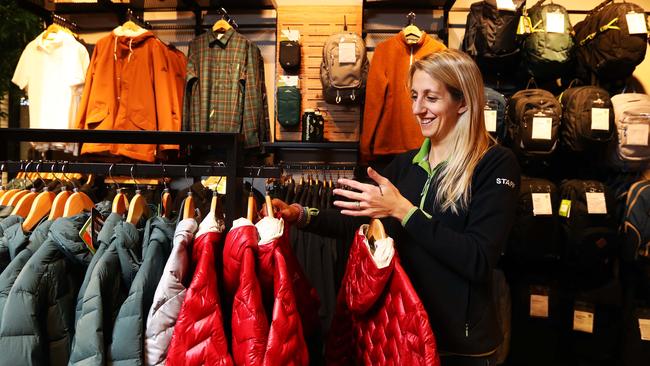
8.10am: Dow ends above 30,000 for first time
The Dow finished above 30,000 for the first time, powering higher thanks to optimism about coronavirus vaccines and receding US political risk.
At the closing bell, the Dow Jones Industrial Average stood at 30,045.84, up 1.5 per cent or around 450 points.
The broad-based S&P 500 jumped 1.6 per cent to 3,635.41, also a record, while the tech-rich Nasdaq Composite Index advanced 1.3 per cent to 12,036.79.
AFP
7.41am: NZ economy ‘relatively resilient’ to pandemic
New Zealand’s economy has been “relatively resilient” to the shock of the coronavirus pandemic due to local containment of the virus and significant stimulus, the central bank said.
The bank, which released its regular report on financial stability, reiterated that it plans to reimpose restrictions on mortgage lending following an increase in high-risk lending.
The bank’s low-rates policy and removal of lending restrictions in March has been criticized for causing a too-rapid increase in house prices. Lack of new supply of housing is the underlying factor in rising prices.
Economic resilience means that the financial system hasn’t been tested as severely as could have been the case, Reserve Bank of New Zealand Governor Adrian Orr said in a statement.
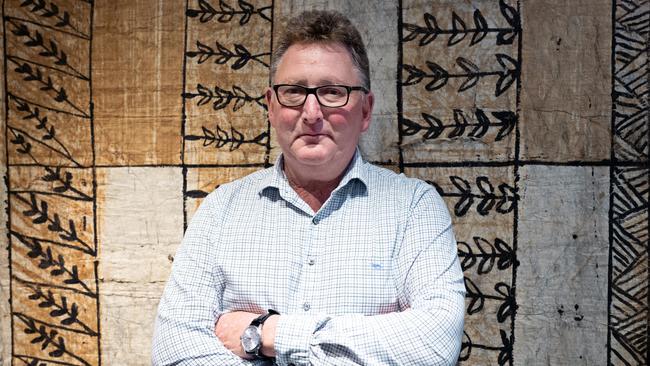
Dow Jones Newswires
7.34am: Fisher & Paykel Healthcare profit up 86pc
Fisher & Paykel Healthcare raised its full-year revenue and earnings forecasts as the coronavirus pandemic continues to significantly boost international sales of its hospital equipment.
The New Zealand-based company reported a half-year net profit of $NZ225.5 million up 86 per cent from a year earlier, driven by a near doubling in hospital revenue.
The higher profit reflected increased sales of the company’s nasal airflow systems, Fisher & Paykel said. Hospitals have increasingly adopted “nasal high flow therapy” in treating patients sickened by Covid-19, it said.
The company said it now expects a full-year net profit of $NZ400 million to $NZ415 million, up from its previous forecast of $NZ365 million to $NZ385 million.
The forecast assumes that equipment sales to hospitals return to normal levels from January 2021.
It raised its full-year revenue forecast to $NZ1.72 billion from $NZ1.61 billion.
Dow Jones Newswires
7.15am: Oil rally signals growth optimism
A recent rise in oil prices has continued, sending crude to its highest level since early March with investors wagering on a brighter economic outlook and higher demand for fuel.
US crude-oil futures for January delivery advanced 4.3 per cent to $US44.91 a barrel, rallying for the sixth time in seven sessions and eclipsing their peak closing level from late August.
Brent crude, the global gauge of oil prices, added 3.9 per cent to $US47.86 a barrel, also posting its highest close since March.
Oil started the year above $US60, briefly tumbled below $0 for the first time ever in April as coronavirus shutdowns crippled demand, then rebounded around $US40 this (northern) summer.
Prices had hovered around the $US40 level for months, but upbeat coronavirus vaccine trial results in recent weeks are igniting fresh gains. The data from Moderna and the duos of Pfizer Inc. and BioNTech SE and AstraZeneca PLC and the University of Oxford are fueling hopes that global consumers will be vaccinated more quickly than previously expected and could resume traveling.
That would be a boon for energy producers like Chevron Corp. and Exxon Mobil Corp. because oil demand rises when more people are driving and flying and ships laden with goods are traveling all over the world. The pandemic fueled a historic drop in fuel demand early in the year and prompted a fresh selloff in late October, but traders now expect a recovery in consumption to extend the oil rebound into 2021.
“It’s a total change of vibe,” said Robert Yawger, director of the futures division at Mizuho Securities USA. “Everything is much more positive now.”
In another sign analysts are more optimistic about future oil demand, US crude futures that expire next summer now cost more than futures expiring later in 2021. That condition, known as backwardation, signals higher expected consumption and sends a bullish signal to investors who often have to sell contracts that expire sooner and buy longer-dated futures.
Dow Jones
7.00am: ASX set to open higher after US gains
Australian stocks are set to open higher after Wall Street’s Dow index topped 30,000 for the first time, as political uncertainty in Washington eased.
Shortly before 7am (AEDT) the SPI futures index was up 38 points, or 0.6 per cent.
The move to a transition to a Biden presidency, as well as more encouraging news on a coronavirus vaccine, helped lift the ASX yesterday. After surging as much as 1.5 per cent to a fresh nine-month high of 6661.4 points intraday, Australia’s S&P/ASX 200 share index closed up 1.3 per cent at 6644.1, adding $26bn of value.
The Australian dollar was higher at US73.50.
Brent oil was up 3.9 per cent to $US47.86 a barrel.
Spot iron ore added 0.7 per cent to $US127.75 a tonne.

5.22am: Dow tops 30,000 for the first time
The Dow Jones Industrial Average jumped past 30,000 for the first time, the latest milestone in a postelection rally turbocharged by promising results from three potential coronavirus vaccines.
The index of blue-chip companies gained more than 480 points in recent trading, or 1.6 per cent, to push it to 30,075 -- the Dow’s highest intraday level in history.
The rise beyond 30,000 underscores this year’s remarkable journey for the Dow industrials. The blue-chip index flirted with 30,000 in February, then dropped below 19,000 in March as the coronavirus pandemic spread. The index has since soared, thanks, in part, to an improving economic landscape and low-interest rates that have boosted the appeal of riskier assets.
President Trump, who often tweets about the rallying stock market, called the 30,000 milestone a “sacred number” in a short press conference.
Tuesday’s leg up came after Mr. Trump said his aides would co-operate with President-elect Joe Biden’s transition to the White House, easing investors’ concerns about a drawn-out period of uncertainty.

Investors are cheering signs that a protracted fight over control of the White House is potentially drawing to a close, reducing political risks over the winter months. The General Services Administration chief said Monday that her agency would provide Mr. Biden federal resources meant to assist in a smooth transfer of power. Mr. Trump also said he has instructed aides to help with the transition.
“This is very positive: it means that we finally might get an orderly transition process,” said Luc Filip, head of private banking investments at SYZ Private Banking. “That would relieve some of the uncertainties that have been weighing on the market over the past two to three weeks.”
The S&P 500 rose 1.6 per cent, pointing to a second day of gains, while the Nasdaq Composite rose 1.2 per cent.
Optimism also increased Monday after The Wall Street Journal reported that Mr. Biden plans to select former Federal Reserve Chairwoman Janet Yellen as Treasury secretary. Ms. Yellen has said recently the recovery will be uneven and lacklustre if Congress doesn’t spend more to fight unemployment and keep small businesses afloat.
The digital currency bitcoin, meanwhile, rose 5.5pc to $US19,392, closing in on its record high of $US19,783 set in December 2017.
In bond markets, the yield on 10-year U.S. Treasury notes edged up to 0.873pc, from 0.857pc on Monday.
Brent crude, the international benchmark for oil, rose to its highest since the turmoil in markets in the spring, ticking up 4.1pc to $US47.93 a barrel. US crude oil rose 4.8pc to $US45.11.
“Oil demand rebound in 2021 is now a certainty, and markets are not waiting to price it in,” said Bjarne Schieldrop, chief commodities analyst at Nordic bank SEB. “Add in the new stability from Biden, and it is again possible to make sensible predictions.”
Overseas, the pan-continental Stoxx Europe 600 rose 0.8pc.
Dow Jones Newswires
5.18am: Bitcoin flirts with new highs
Bitcoin soared above $US19,000 for the first time since the heady days of December 2017. It peaked at $US19,392 on Tuesday, less than 2pc off its all-time high of $US19,783.
The cryptocurrency is enjoying a rally similar to the one that caused a sensation -- and dominated Thanksgiving dinner talk -- in 2017. But the causes appear to be different this time.
Bitcoin has ridden a wave of enthusiasm from some new corners this year. Notably, billionaires and institutional investors are warming to the digital asset, citing the loose monetary policies at the Federal Reserve as one reason. Because Bitcoin’s supply is capped at 21 million, bulls argue that it is a hedge against currency devaluation. Gold also tends to rally for the same reasons, but it hasn’t done nearly as well as Bitcoin this year. In fact, gold has fallen more than 2pc this month.
Billionaire investors like Paul Tudor Jones and Stanley Druckenmiller have said they have bought some Bitcoin as a hedge. Public companies including Square (ticker: SQ) and MicroStrategy (MSTR) have announced they are holding Bitcoin on their balance sheets as a kind of reserve.
And retail investors are again dipping their toes back in. Those who were burned when the price fell swiftly in 2018 may have short memories or new-found confidence. PayPal Holdings (PYPL) just enabled Bitcoin-buying for many of its 300 million users, and Square and investing app Robinhood already allowed it.
Dow Jones
5.08am: Copper miners set to enjoy higher prices
The shift to renewable energy is here and only getting stronger, and investors can’t seem to get enough of it. But the industry faces a big problem: it’s heavily reliant on copper and there is a shortage.
So note analysts at Jefferies, who lay out a scenario of big demand for copper, alongside miners poised to benefit, in a recent note to clients. “Based on our analysis, the copper market is headed into a multiyear period of deficits, in part due to secular demand in renewable energy and EVs [electric vehicles],” say a team led by Christopher LaFemina.
The analysts predict higher prices are coming and will “lead to substitution to other materials,” needed to bring the market to balance.
That growing demand has had two key sources. The first, a shift from coal and gas power to wind and solar, works in copper’s favour because those systems require five times more copper than conventional ones. For example, offshore wind takes around 15 tonnes per megawatt of installed capacity, while onshore wind and solar take around 5 tonnes and conventional power one.
The analysts expect copper demand in renewable energy to rise from 991 kilotons in 2020 to 1.9 megatons in 2030.
The other source of copper consumption is electric vehicles, which take around 83 kilograms on average, while charging points need 10 kilograms of copper. LaFemina expects copper demand will rise to 1.7 megatons in 2030 from 170 kilotons in 2020.
In their bear case for copper itself, the analysts see the market “adequately supplied until 2025 before deficits kick in,” but even so the path of least resistance is higher for the metal. “If our assumptions are correct, the squeeze higher in copper is a question of ‘when’ rather than ‘if,’ they say.
As for stocks to play this copper demand, Jefferies upgraded Antofagasta and Glencore from hold to buy, and reiterated Freeport and First Quantum as top picks. Other miners with bullish ratings are BHP Group, Rio Tinto and Vale.
Dow Jones Newswires
5.05am: Dow hits 30,000 points for first time
US stocks reached a historic milestone as hurdles were removed from President-elect Joe Biden’s path to the White House in January.
The Dow Jones Industrial Average hit 30,000 points for the first time ever as US political uncertainty declined and confidence grew that vaccines for the coronavirus could soon be available around the world.
In addition to news that the administration of President Donald Trump was starting to work with Biden’s team, the “Keystone State” of Pennsylvania certified his victory there, all but ensuring that Biden would be officially declared the next US leader.
“Signs of movement in the US political deadlock have combined with the steady drip of vaccine news to underpin” stocks, commented Chris Beauchamp, chief market analyst at IG trading group.
in midday trade (US time), the blue-chip Dow Jones Industrial Average was up by 1.5 per cent at a record 30,026.68 points.
“What’s prevailing in the stock market right now... is a belief that only good outcomes will prevail, whether we are talking about leadership transitions, the coronavirus, the economy, earnings, interest rates, inflation, and the performance of the stock market itself,” Patrick J. O’Hare at Briefing.com said.
In Europe, London’s benchmark FTSE 100 index closed with a gain of 1.6 per cent, with airlines boosted by news that England will loosen quarantine rules for travellers from abroad.
Frankfurt’s DAX 30 added 1.3 per cent, as investors reacted also to data showing that Germany’s economy grew by a better-than-expected 8.5 per cent in the third quarter.
Paris added 1.3 per cent.
Earlier in Asia, Tokyo soared more than two per cent as investors returned from a long weekend, while Sydney was more than one per cent higher.
Singapore, Seoul, Mumbai, Wellington and Jakarta also chalked up healthy gains. Hong Kong could only eke out a small rise after a local spike in coronavirus infections forced leaders to consider imposing fresh containment measures.
Oil prices reached their highest levels since the first wave of the pandemic hit.
And bitcoin traded above $US19,000 for first time in almost three years, closing in on its all-time high of just under $US20,000.
AFP
5.02am: US consumer confidence sinks
The outlook among US consumers is increasingly grim, sending confidence lower as the country grapples with a surge in COVID-19 cases, according to a survey.
The Conference Board, a New York-based business research organisation, reported consumer confidence falling slightly more than expected to 96.1 from its upwardly revised 101.4 in October, driven mostly by worsening forecasts for the months ahead.
“Heading into 2021, consumers do not foresee the economy, nor the labour market, gaining strength,” senior director of economic indicators Lynn Franco said.
“In addition, the resurgence of COVID-19 is further increasing uncertainty and exacerbating concerns about the outlook.”
AFP
5.00am: Musk now world’s second wealthiest person
Elon Musk, the charismatic chief of electric automaker Tesla, has overtaken Bill Gates to become the world’s second richest person, according to the Bloomberg list of billionaires.
The South African-born Musk, 49, added $US7.2 billion in wealth on Monday alone following Tesla’s latest surge. He now has an estimated $US128 billion.
The outspoken Musk, who is also co-founder of SpaceX, had already overtaken numerous luminaries in recent weeks, including Facebook Chief Executive Mark Zuckerberg and Bernard Arnault, the head of French luxury giant LVMH.
Now the only person he stands behind is Amazon founder and CEO Jeff Bezos, whose wealth is estimated at $US182 billion.
The upheaval of the coronavirus pandemic has allowed the ultra-rich to amass even more wealth as technology companies have gobbled up more market share of the economy.
In 2020, Tesla shares have surged more than 500 per cent and the company is now valued at more than $US500 billion.
Musk, who owns about 18 per cent of the shares, has made some $US100 billion during this stretch.
Tesla shares have gained further since the presidential election of Joe Biden, who favours more aggressive policies to address climate change. Tesla was also boosted by an announcement that it is being added to the prestigious S&P 500 index.

AFP
4.57am: Ikea furnishes strong results
Consumers continued to spend strongly to furnish their homes despite the coronavirus pandemic, the holding company that includes most Ikea stores said.
Ingka, which includes shops that account for 90 per cent of sales by the Swedish flatpack furniture giant, suffered only a 5.0 per cent drop in revenue for its September 2019-August 2020 financial year, to 37.4 billion euros ($US44.4 billion).
Net profit, however, fell by a third to 1.2 billion euros.
The drop in sales was considerably lower than one might have expected given the extent of store closures during the first wave of the pandemic.
Around three-quarters of the 378 Ikea stores owned by Ingka were closed for roughly seven weeks, which works out to a 15 per cent reduction in days open for business.
But the fact that sales were down only by a third of that “proves that covid has helped us as a society to pay attention to what’s important in life: health, family, love but also home,” Ingka financial director Juvencio Maetzu told AFP.
Many consumers used lockdown time to work on home improvement projects or invested in creating home offices.
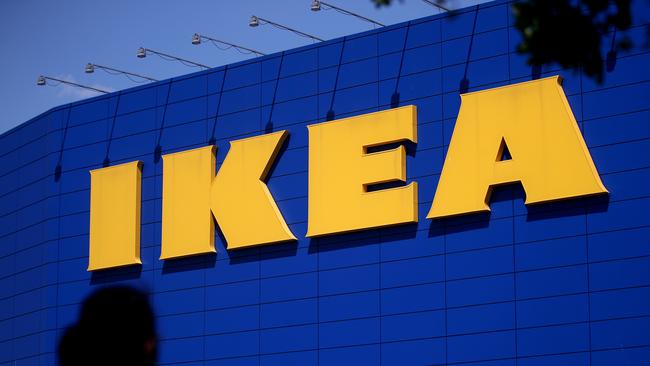
AFP
4.55am: Virus crisis to cut airline 2020 revenues 60pc
Airline revenue this year will plunge 60 per cent as a result of the coronavirus pandemic which threatens the survival of the industry, the International Air Transport Association (IATA) said.
“The COVID-19 crisis threatens the survival of the air transport industry,” with 2020 likely to go down in history as its “worst” year ever, IATA said.
It said that while airlines have been slashing costs by $US1 billion a day, grounding fleets and cutting jobs, they are still racking up huge and “unprecedented” losses.
AFP
4.50am: India’s love affair with coal cools
Funding for coal projects in India has plunged for the second straight year, new figures showed, as the world’s second biggest coal importer weans itself off the dirty fuel.
Research was released showing a drop in investment days after Prime Minister Narendra Modi reaffirmed the country’s commitment to exceeding its targets under the Paris climate agreement.
India has the world’s fourth-largest reserves of the fossil fuel and its cities are often shrouded in coal-induced smog, but Modi on Sunday told a virtual G20 summit that the South Asian giant was “exceeding” its targets.
Coal financing dropped 82 per cent last year following a 90-percent decline in 2018, the Delhi-based Centre for Financial Accountability said in a report.
The authors, who analysed 50 loans to 43 coal-fired and renewable projects in India last year, said there was also a “significant drop” in state financing for coal.
Lending to renewable developments contracted by six per cent but it made up 95 per cent of total investment in energy, the group said.
“A significant drop in project finance to coal means that financial institutes are beginning to realise the associated financial and reputational risk in investing in coal,” the group’s executive director Joe Athialy said.
AFP
4.45am: Saudi Aramco hit by Huthi strike
Saudi Aramco said a strike by Yemen’s Huthi rebels on its plant in Jeddah tore a hole in an oil tank, triggering an explosion and fire that was however quickly extinguished.
The Iran-backed Huthis said they had fired a Quds-2 missile Monday in retaliation for Saudi Arabia’s role at the head of a military coalition that supports the government in Yemen’s long conflict.
Aramco took reporters Tuesday to the distribution facility where damage to the storage tank was visible, with the top rim fire-blackened and a railings above buckled from the heat.
“Unfortunately the facility was hit yesterday by a projectile, by a hostile attack. As you know Aramco has been a target of such hostile attacks,” said Abdullah al-Ghamdi, manager of the North Jeddah Bulk Plant.
The roof of the tank suffered “major damage” with a hole measuring two metres (six feet) across, he said. “It was a big fire, it was a big explosion but it was controlled.” The manager said that distribution from the plant, which provides refined products including jet fuel to the country’s west, was restored within three hours even though the damaged tank -- one of 13 -- remained out of action.
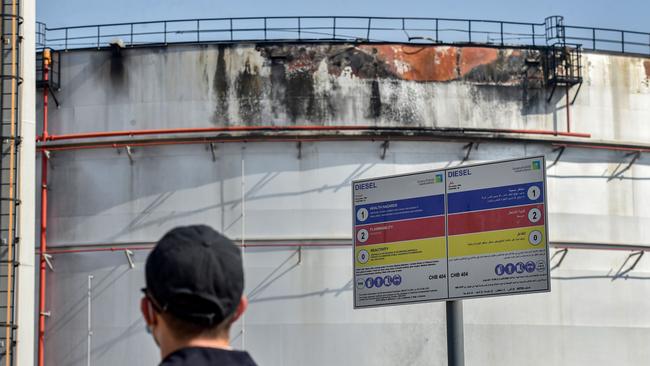
AFP
4.40am: DAX index to add 10 companies
The Frankfurt stock exchange’s blue-chip share price index, the DAX, will add 10 companies so as to better match its international peers, market operator Deutsche Boerse said.
The change, aimed at bringing the index into “line with international standards,” will take place in September next year, it said.
The DAX comprises Germany’s largest companies but one of its most high-profile firms, the fintech Wirecard, collapsed in a massive fraud scandal earlier this year.
Wirecard admitted in June that 1.9 billion euros ($US2.3 billion) missing from its accounts did not in fact exist at all, sparking a storm of criticism over how the company had been able to operate without regulators noticing problems.
Deutsche Boerse said inclusion in the new index will require companies among other things, to show that they have made an operating profit for at least two years.
Some have criticised the latest entry into the DAX, the takeaway provider Delivery Hero, which has never made a profit.
However, the relatively small number of companies in the blue-chip index -- compared with 40 in France’s CAC and the FTSE 100 -- has led some to believe that the DAX does not properly represent Europe’s largest economy.
AFP

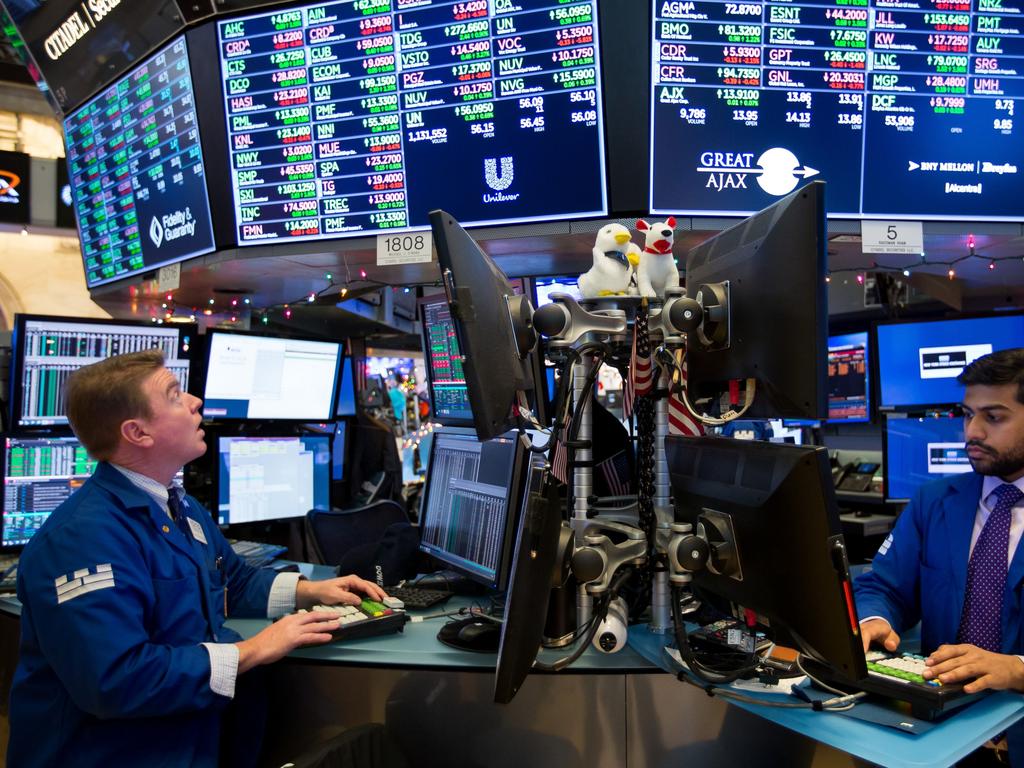


To join the conversation, please log in. Don't have an account? Register
Join the conversation, you are commenting as Logout